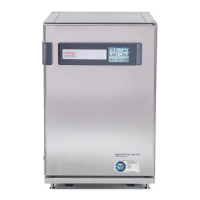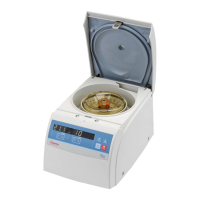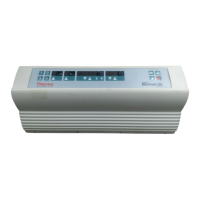
Do you have a question about the Thermo Scientific HERACELL VIOS 160i LK and is the answer not in the manual?
| Type | CO2 Incubator |
|---|---|
| Temperature Range | Ambient +3°C to 55°C |
| Temperature Uniformity | ±0.3°C at 37°C |
| CO2 Control Range | 0 to 20% |
| CO2 Control Accuracy | ±0.1% |
| O2 Control Range | 1 to 21% |
| Capacity | 165 liters |
| Humidity Range | Up to 95% RH |
| Sterilization | 180°C |
| Shelves | 4 standard |
| Electrical Requirements | 230V, 50/60Hz |
Provides an overview of general information, device identification, and operating personnel instructions.
Outlines how the operating instructions apply and notes regarding translations and accessibility.
Specifies the conditions and duration for the incubator's operational warranty.
Defines warning, caution, and notice symbols used in the operating instructions for safety awareness.
Defines the correct use and application scope of the CO2 incubator.
Provides critical safety information regarding the use of gases like CO2, O2, and N2 with the incubator.
Instructs on immediate checks upon delivery for completeness and any potential damage.
Lists all components included as standard with the HERACELL VIOS 160i LK / 250i LK models.
Lists optional components available for the HERACELL VIOS 160i LK model.
Lists optional components available for the HERACELL VIOS 250i LK model.
Specifies the required ambient conditions for operating the device safely and effectively.
Outlines the necessary clearances and accessibility requirements for device installation.
Provides instructions and warnings for safely transporting the device, emphasizing correct lift points.
Explains the possibility and methods for stacking multiple devices, including the use of adapters.
Provides step-by-step instructions for installing the support stand with castors.
Options include threefold or sixfold screens, with or without Cell Locker, for improved sample access.
Optional sensor for enhanced CO2 measurement accuracy and performance.
Optional interface for data output, converting internal values to a continuous output current.
Optional system for monitoring gas supply levels and providing supply status information.
Illustrates and identifies components visible on the front of the HERACELL VIOS 160i LK and 250i LK models.
Shows and labels the components and connections located on the rear of the incubator.
Details the built-in safety features designed to protect the user and the samples.
Explains the controlled environmental conditions within the incubator's workspace.
Provides guidelines on the type and quality of water required for the humidity reservoir to ensure optimal performance.
Explains the role of the HEPA-filter in minimizing contamination and the function of the air duct for temperature distribution.
Details the CO2 supply requirements, control range, and gas quality specifications for cell culture growth.
Details the various sensors installed for monitoring temperature, O2, CO2, and humidity within the workspace.
Illustrates and lists the standard connectors on the control box for basic functions and optional elements.
Lists interfaces available only with specific optional configurations, such as 4-20 mA and O2 connectors.
Explains how to connect gas supply lines, required pressure, and the function of the gas inlet filter.
Details the USB interface for PC connection, data acquisition, and driver software requirements.
Describes how to connect the device to an external alarm system via a potential-free alarm contact.
Guides on connecting the unit to the power supply, including safety checks for voltage and cable integrity.
Describes the design of the interior container for preventing contamination and ensuring air quality.
Describes the standard glass door and the benefits of optional gas-tight screens for reduced contamination.
Details the water reservoir's design, separation from the workspace, and draining mechanism.
Guides the user on how to fill the water reservoir using a re-filling funnel and the correct water levels.
Details the perforated support rails and shelves, including tilt protection and withdrawal stops.
Explains the function of the door lock assembly as a safety device during decontamination routines.
Outlines the necessary cleaning of workspace components before initial start-up and decontamination.
Provides instructions for installing the fill level indicator and pre-filter without tools.
Details the assembly process for the air duct, including joining parts and locking keyholes.
Provides steps for inserting the HEPA-filter into the airbox and placing the airbox onto the cover panel.
Explains how to install and remove support rails for the shelving system using spring pressure.
Details the process of sliding shelves onto supports, including tilt protection and withdrawal stops.
Guides the installation of optional split inserts into the HERACELL VIOS 250i LK for customized shelving.
Provides instructions for connecting gas pressure hoses, including safety precautions for pressure compensation.
Explains how to connect combined CO2/O2/N2 supply with an optional gas monitoring system.
Guides on connecting the unit to the power supply, including safety checks for voltage and cable integrity.
Details how to connect the unit via USB, including driver installation and baud rate settings.
Explains how to connect the device to an external alarm system using the potential-free contact.
Shows the pin-out for the 4-20 mA data interface and notes on skilled work for connection.
Outlines pre-operation checks on gas hoses, access port, door seal, and other components.
Instructs on running the steri-run routine or other decontamination methods for the workspace.
Provides a step-by-step guide to starting the incubator, including opening doors and filling the water reservoir.
Details the steps for initiating the device with the auto-start routine and setting parameters.
Provides guidance on loading the workspace with cultures, emphasizing air circulation and loading surface limits.
Explains the touchscreen interface, its areas, and the function of various keys and icons.
Guides on setting the incubator's temperature set value through the temperature menu.
Guides on setting the CO2 concentration value through the CO2 menu.
Guides on setting the O2 concentration value, applicable to models with optional O2/N2 control.
Details the automated routine for startup and adjustment of CO2 sensing circuits, including temperature and humidity stabilization.
Provides instructions for preparing and launching the auto-start routine, including gas supply and water level checks.
Explains how to interrupt, resume, or cancel the auto-start routine using the status dialog box.
Introduces the steri-run routine for decontaminating the workspace, shelf system, and sensors.
Allows user interface and device function adjustments to meet operational requirements.
Allows access to dialog windows for customizing the user interface, including keypad lock, date/time, and display settings.
Describes the error detection system, signals, and messages, including audible alarms and display indicators.
Explains how to display the cause of an overtemperature error and reset the protection.
Provides steps to take after a power outage to ensure safe operation and dry sensors, including disinfection if needed.
Presents error tables indicating failure messages, causes, remedies, and alarm status for system and temperature control loops.
Provides a step-by-step procedure for safely shutting down the device, including decontamination and draining.
Offers safety hints and procedures for cleaning exterior surfaces and the display using appropriate agents.
Outlines compatible disinfection procedures like wipe/spray and the automated steri-run routine.
Describes the three stages of manual wipe/spray disinfection, including precautions for disinfectants and rinsing steps.
Explains the automated steri-run cycle, its temperature, duration, germ reduction efficiency, and door lock mechanism.
Guides on activating the steri-run routine by pressing the key and starting the process.
Explains how to release the door lock after canceling steri-run or if it aborted due to an error, using the emergency release lever.
Lists daily and annual checks required to ensure operational performance and safety of the device.
Outlines the recommended service tasks to be performed at 3-month, 6-fold gas tight screen, and annual intervals.
Provides a step-by-step guide for calibrating the incubator's temperature sensor using a measuring instrument.
Guides on performing CO2 calibration by entering measured values into the calibration menu.
Provides step-by-step instructions for replacing the HEPA-filter, including powering down and removing components.
Explains how to replace the gas inlet filter, including shutting off gas supply and loosening the hose clamp.
Lists the materials used in the device construction and their disposal guidelines.
Lists the detailed technical specifications for the HERACELL VIOS 160i LK model.
Lists the detailed technical specifications for the HERACELL VIOS 250i LK model.
Describes the USB interface for PC connection, including compliance with standards and virtual COM port operation.
Guides on installing the USB driver software from the data CD using the Windows Hardware Wizard.
Explains the ASCII character-based command sequences for data exchange between PC and incubator.
Explains the structure of the error memory, including possible error messages in hex and bit coding for control loops.
Explains the data logger's storage capacity, information stored, and querying commands for accessing logged data.
Introduces the software program for managing data communication, including error logging and service file creation.
Details the operation of the user interface, including MAIN menu functions and GENERAL submenus like PRESETTING and ERROR LOGGER.
Provides a template for listing carried-out works, including device type, serial number, location, and details of maintenance performed.
Contact details for sales, service, and helpdesk for Germany.
Contact details for sales and service for Europe, Middle East, and Africa.
Contact details for sales and service inquiries in North America.
Contact details for sales and service inquiries in Latin America.
Contact details for sales and service inquiries in the Asia Pacific region.
Lists contact details for USA/Canada, Australia/New Zealand, and other listed European countries.











